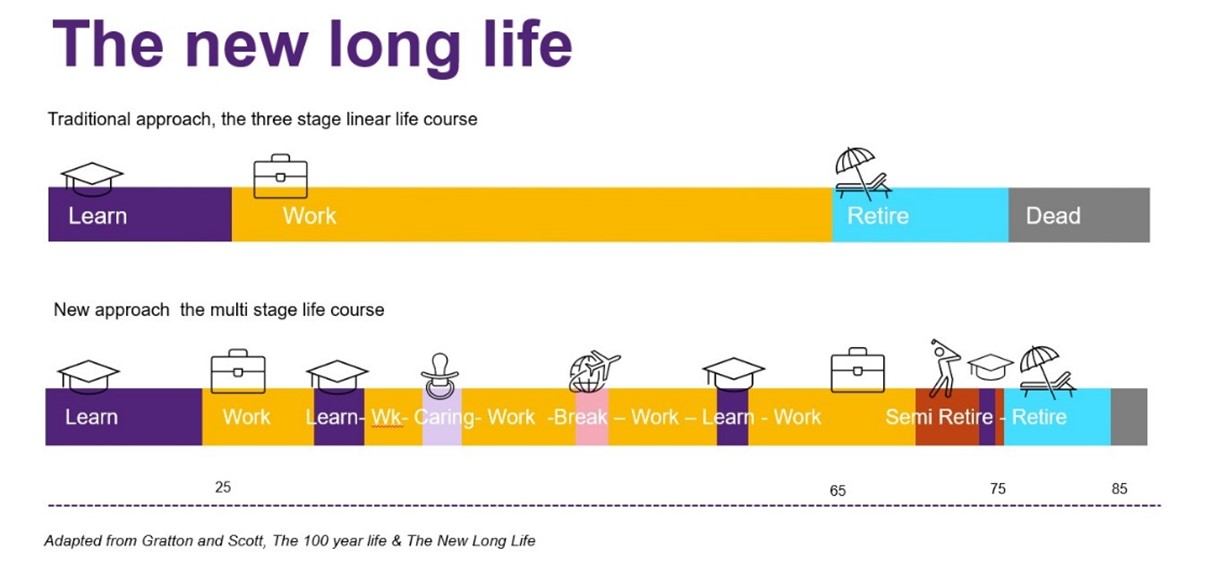The Advantages of Lifelong Learning
The Four Key Benefits of Lifelong Learning
- Employment Benefits of Lifelong Learning
- Cognitive Benefits of Lifelong Learning
- Social Benefits of Lifelong Learning
- Community Benefits of Lifelong Learning
Lifelong learning has many benefits to individuals including employability, health, and wellbeing and to society in terms of social prosperity, and civic participation [1]. In this post we consider the definitions of what constitutes lifelong learning and then delve into the research to highlight four of the key findings in terms of benefits. We then consider the growing emphasis on the importance of lifelong learning from a societal perspective, locally and on a global scale, as we adapt to the seismic shifts in population demographics occurring all over the world.

“Commit yourself to lifelong learning. The most valuable asset you’ll ever have is your mind and what you put into it.”
by Albert Einstein
What is Lifelong Learning?
Lifelong Learning encompasses any and all activities approached with the intention of improving knowledge. This includes skills and competencies, whether personal, civic, social or work related. The critical point that distinguishes these activities from non-learning activities such as hobbies, entertainment or cultural activities is the intention to learn something new. [2]
Is it the same as Adult Education?
Adult education is contained within Lifelong Learning but refers specifically to the time after formal education and before the age of 65 years. Other terms that are used are continuing education, personal and professional development, any intent to acquire new knowledge after formal education is included in the definition of lifelong learning.
“Anyone who stops learning is old, whether at twenty or eighty. Anyone who keeps learning stays young.”
by Henry Ford
Four Key Benefits of Lifelong Learning
1. Employment Benefits of Lifelong Learning – Lifelong learning is continuous investment in the development of skills that enable an individual to stay relevant in the workforce. As the world changes rapidly, certain skills become outdated and useless therefore continuous lifelong commitment to learning new skills enables us to adapt in line with workplace changes and enable career advancement at all stages of life. Investing in lifelong learning in the adult working population has become critical due to the many changes brought about by the digital transformation and in 2019 the Swiss Employer’s Association (SAV), with digitalswitzerland launched the #LifelongLearning campaign to promote a growth mindset and inspire the Swiss population and employers to take advantage of the opportunities of the future [3]. Lifelong Learning is considered so vital to global prosperity that it is also a feature of UN Sustainable Development Goal (SDG4) which translates into significant encouragement of lifelong learning programs including within institutes of higher education, that are open to people of all ages and backgrounds [4].

2. Cognitive Benefits of Lifelong Learning – the brain is like a muscle that requires regular workouts to keep it strong and heathy, and learning new things is the best workout you can give your brain. It used to be thought that neurogenesis – the generation of new brain cells – slowed after birth and ceased after adolescence resulting only in decline from there on. However, more recent studies have debunked this notion demonstrating that new brain cells continue to be made well into old age. Neuroplasticity is the term that describes the malleability of the brain, such that we have the ability to form and strengthen new connections in the brain when we learn and practise new skills. Lifelong education builds cognitive reserves that have been shown to protect against the effects of dementia and other degenerative diseases. A 2014 study noted that ‘lifetime intellectual enrichment may delay the onset of cognitive impairment and be used as a preventative intervention against the onset of dementia’. [5]

3. Social Benefits of Lifelong Learning – being involved in lifelong learning programs creates expanded social connections that leads to greater levels of interaction which is proven to be a benefit to health, happiness, and feelings of wellbeing that can in turn prolong independent living and enriched quality of life [6]. A 2014 survey of over 8,000 lifelong learners in the EU found that over 85% of respondents reported high levels of improvement in social engagement, mental wellbeing, tolerance and sense of purpose in life [7].

4. Community Benefits of Lifelong Learning – lifelong learners are statistically more likely to be community orientated with higher rates of volunteerism. It seems to be that lifelong learners are more aware, more engaged, and more confident in their abilities to the extent where they become more involved in the civic world around them. A key benefit of this is that being involved as a volunteer has a significant positive impact on a person’s level of subjective wellbeing.

Why is it important?
We are all living longer and need to adapt to the gift of more time with new ways of thinking and doing, education is the key to unlocking the potential of every stage of life and essential as our population of over 65’s continues to grow at an unprecedented rate.
Changing Demographics – We are all living longer [8]. One of the greatest achievements of humanity in the last 200 years is the doubling of life expectancy. A person born in Europe in 1820 had a life expectancy of less than 40 years whilst one born in 2020 can reasonably expect more than 82 years. Interestingly, the average Swiss has one of the world’s highest life expectancies, ranked fifth in the world in 2018, just behind Japan and 12 years above the global average at 85 years. [9] (The secret, apparently, is wealth, wellbeing, and a love of cheese. 😉 ) Whilst longevity is increasing, birth rates are falling, which results in a rise in the average age of the population which is referred to as population ageing. The world hit a milestone in 2018 when the number of people over 64 years surpassed the number of children under the age of 5 years [10]. Globally the population aged over 65 is growing faster than any other group and by 2050 one in four persons in Europe will be aged over 65. In Switzerland this percentage has grown from 10% in 1960 to 19% in 2020 [11].
The traditional view of a three-staged life is obsolete, replaced with a new, multi-staged, lifecourse.
The traditional life course of three stages; education in youth, work in adulthood followed by a short period of retirement before death, is increasingly obsolete. The alternative is a multi-staged lifecourse where periods of work, education and breaks for travel or caring are experienced in multiple stages. With increased lifespan there will be an increase of the need and of opportunities to work longer and this requires multiple phases of education, or lifelong learning.

This new long life provides opportunity and necessity for rethinking the way we approach our life in terms of periods of work, employment and education and reinforces the importance of engaging in continuous learning to stay relevant, engaged and connected.
The Higher Education landscape is shifting rapidly to accommodate changes in population demographics; the pool of younger students is diminishing and there is greater demand from learners of all ages who wish to engage in formal learning either for career advancement or for personal growth. Technology advances have increased accessibility of learning options which has led to the rapid expansion of learning programs and platforms. Almost anything can be learned anywhere by anyone in a variety of ways. This abundance of options offers many exciting possibilities to any curious learner. Best of all there are abundant low-cost and free offers from many of the world’s leading educational institutes that can be accessed with minimal set up requirements on behalf of the learner.
“The more that you read, the more things you will know. The more that you learn the more places you’ll go.”
by Dr. Seuss
Summary
Lifelong learning is not only a means to achieve economic growth and employability but also a means to increase individual wellbeing and societal prosperity [1]. This is especially applicable to older adults and of great significance when we consider that our demographics are changing rapidly, and the largest growth demographic is adults over 65 years. This population group within the EU is projected to increase significantly, from 446.8 million in 2019 to 449.3 million in 2050. Within Switzerland the percentage of over 65s in 2021 was 19.4% and this is growing at an annual rate of just over 1%. Lifelong learning offers many benefits, the top four benefits are in the realms of employment, cognition, social and community.
Lifelong Learning can come in many various forms, from short informal courses to a University Degree. Technology has opened up many ways to engage with learning from the comfort of your own home and to a personalised schedule. WiseLearn is a digital learning platform specifically focussed on the learning style of seniors in the European context. We envision a world that supports healthy ageing through life-long learning.
TLDR: (as in “too long didn’t read”)
Lifelong Learning can occur in many different forms and there is a wealth of free and paid offers available to learners of all ages and abilities. Engaging in lifelong learning has four significant areas of benefits to the individual and to society, these are employment, cognitive, social and community. There are many opportunities to engage with learning, the Old School platform is an exciting new offer designed specifically for senior learners over 65 years.
Author: Sophie Griffiths
References
- Rüber, I.E., R. Sai-Lila, and B. Schmidt-Hertha, Lifelong learning – lifelong returns? A new theoretical framework for the analysis of civic returns on adult learning. International Review of Education, 2018. 64(5): p. 543-562.
- eurostat. Glossary: Lifelong learning (LLL). Statistics Explained; Available from: https://ec.europa.eu/eurostat/statistics-explained/index.php?title=Glossary:Lifelong_learning_(LLL).
- digitalswitzerland. #LifelongLearning. Available from: https://lifelonglearning.ch/en/about-us/.
- Nations, U. Ensure Inclusive and Equitable Quality Education and Promote lifelong Learning Opportunities for all. Sustainable Development Goals (4) 2015 [cited 2023; Available from: https://sdgs.un.org/goals/goal4.
- Vemuri, P., et al., Association of Lifetime Intellectual Enrichment With Cognitive Decline in the Older Population. JAMA Neurology, 2014. 71(8): p. 1017.
- Tuckett, A. Lifelong learning helps people, governments and business. Why don’t we do more of it? EDUCATION, SKILLS AND LEARNING 2017; Available from: https://www.weforum.org/agenda/2017/07/lifelong-learning-helps-governments-business/.
- Thöne-Geyer, D.B., Benefits of Lifelong Learning – BeLL, D.I.f. Erwachsenenbildung, et al., Editors. 2014.
- Scott, A.J., Achieving a three-dimensional longevity dividend. Nature Aging, 2021. 1(6): p. 500-505.
- swissinfo. Why the Swiss live longer. Available from: https://www.swissinfo.ch/eng/multimedia/life-expectancy_why-the-swiss-live-longer/41857826.
- Data, O.W.i. Life Expectancy. 2022; Available from: https://ourworldindata.org/life-expectancy.
- Bank, W. Population ages 65 and above (% of total population) – Switzerland. Available from: https://data.worldbank.org/indicator/SP.POP.65UP.TO.ZS?locations=CH.
Updated: 24.05.2023 // The images used are from www.freepik.com.
